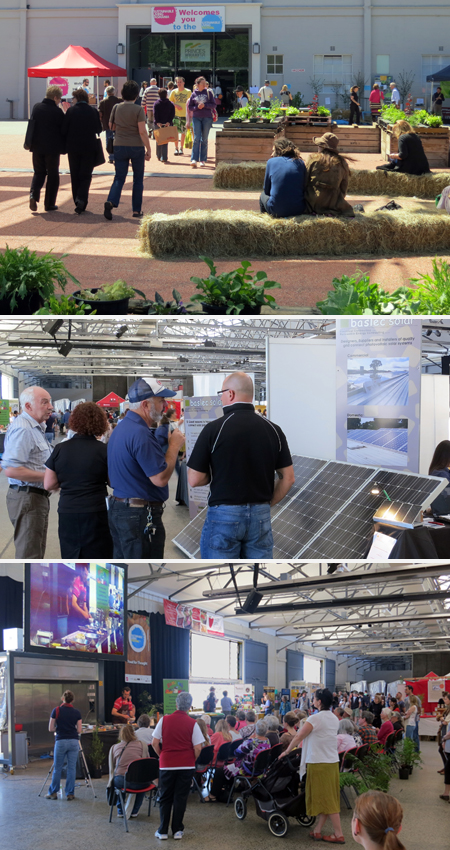Sustainability policy is moving at a snail’s pace in Tasmania, but elsewhere things are moving even more slowly. [13 November 2012 | Peter Boyer]

The Sustainable Living Expo brought crowds to Princes No 1 shed at the weekend.
There’s a story going round that Tasmania is a basket case.
With a near-empty kitty we depend heavily on the feds to sustain our infrastructure. After decades we’re still squabbling over forestry and mining. Our kids can’t find work, the roads need repair, the rail system’s in the red and we’ve lost our international shipping capacity.
Parliament seems impotent, incapable of rising above the rest of us, looking ahead and giving direction. Government agencies are visionless, each stuck in their own little patch, with ministers unwilling or unable to control entrenched bureaucrats. I don’t need to go on.
We all know the story, and most of us believe it’s wholly or largely true. But all things are relative. Perhaps we should also be asking ourselves, when it comes to the long view how do we rate against the rest of the planet?
In the United States (whose debts make ours look like small change), both main presidential candidates deliberately avoided raising climate change as an election issue. Barak Obama mentioned it in his victory speech, but a hostile Congress is bound to oppose any concrete mitigation measures. No joy there.
Europe’s chronic economic morass is beginning to affect governments’ capacity to govern. China and India are powering ahead, but at enormous cost in carbon pollution. Other developing countries are in survival mode, with some governments apparently in meltdown.
The Gillard government is sending out mixed messages. A positive step was its announcement last week that it would sign on to Kyoto II, opening up the longer-term prospect of financial returns for Tasmania’s carbon-sequestering forests by means of offsets under the carbon price scheme.
Which brings me back to this little southern outpost we call home. Here our climate policies are in the hands of a Greens MP, Cassy O’Connor, who earlier this year contracted Sinclair-Knight-Merz to review Tasmania’s Climate Change (State Action) Act of 2008.
The 22 public submissions to the review give a fascinating insight into the capacity of the Tasmanian community — government, business and private citizens — to raise its vision from the here and now and take a longer view.
Eight submissions came from government (five departments, two business enterprises, an advisory council), two from local government, four from business or agricultural bodies, two from federally-funded regional bodies, three from non-government organisations and three from private citizens.
With the notable exception of the Tasmanian Climate Action Council, government submissions showed little initiative and a low level of enthusiasm for strong mitigation measures.
Departments covering premier and cabinet, treasury, education, health, primary industry, water and environment opposed interim emission targets, such as a 40 per cent cut by 2020, arguing they could clash with national targets. Health and Human Services even proposed abandoning the 2050 state target and rejecting other internal government measures, on grounds of cost.
Forestry Tasmania followed its own well-worn path, arguing that carbon stored in standing trees was only part of the forest solution, while lauding the possibilities presented by burning forest waste to make electricity and storing carbon in wood products.
The most detailed and wide-ranging response from any government body came from Hydro Tasmania, probably to be expected given its huge investment in renewable energy.
Hydro was neutral on interim emission targets, but the Hobart City Council and the Local Government Association both favoured them. The Hobart City Council submission said an interim target served to “demonstrate the State’s leadership on climate change”.
Like government departments, commercial and industrial interests showed at best lukewarm interest in strong government action. The Business Council of Australia argued that all “non-complimentary” state policies should be wound up in favour of national measures.
The Tasmanian Chamber of Commerce and Industry supported action “to mitigate the impacts of climate change on communities”, but did not “necessarily” support a federal carbon price, opposed any emission reduction target, and recommended revoking the act itself.
The Tasmanian Farmers and Graziers Association argued strongly (and justifiably) that agricultural processes weren’t well-enough understood to allow the claim in the review’s emissions profile that the industry produced a quarter of the state’s emissions.
Private individuals, non-government bodies and regional environmental groups, in sharp contrast to government and business, argued for much stronger state government commitment to mitigation measures, projecting Tasmania as a leadership model for other states and countries.
The advocacy groups Sustainable Living Tasmania, Climate Action Hobart and Environment Tasmania submitted detailed cases for a strong focus on cutting emissions, with more ambitious targets.
I’m bothered by the apparent disengagement shown in departmental and business responses, and in the painfully slow progress of the Giddings government to implement robust climate measures.
But O’Connor is standing her ground against a hell of a headwind, and the review submissions take on a somewhat rosier glow against the backdrop of a struggling world. Two cheers for Tassie.
• John P. Milton, a prophet of living sustainably and connecting with nature, and one-time adviser to President Jimmy Carter, will give a public talk on the nature of sustainability at the University’s Centenary lecture theatre, Sandy Bay campus, from 6 pm next Monday.
